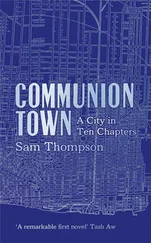Frank Tallis - Deadly Communion
Здесь есть возможность читать онлайн «Frank Tallis - Deadly Communion» весь текст электронной книги совершенно бесплатно (целиком полную версию без сокращений). В некоторых случаях можно слушать аудио, скачать через торрент в формате fb2 и присутствует краткое содержание. Жанр: Исторический детектив, на английском языке. Описание произведения, (предисловие) а так же отзывы посетителей доступны на портале библиотеки ЛибКат.
- Название:Deadly Communion
- Автор:
- Жанр:
- Год:неизвестен
- ISBN:нет данных
- Рейтинг книги:3 / 5. Голосов: 1
-
Избранное:Добавить в избранное
- Отзывы:
-
Ваша оценка:
- 60
- 1
- 2
- 3
- 4
- 5
Deadly Communion: краткое содержание, описание и аннотация
Предлагаем к чтению аннотацию, описание, краткое содержание или предисловие (зависит от того, что написал сам автор книги «Deadly Communion»). Если вы не нашли необходимую информацию о книге — напишите в комментариях, мы постараемся отыскать её.
Deadly Communion — читать онлайн бесплатно полную книгу (весь текст) целиком
Ниже представлен текст книги, разбитый по страницам. Система сохранения места последней прочитанной страницы, позволяет с удобством читать онлайн бесплатно книгу «Deadly Communion», без необходимости каждый раз заново искать на чём Вы остановились. Поставьте закладку, и сможете в любой момент перейти на страницу, на которой закончили чтение.
Интервал:
Закладка:
‘Sperm cells,’ said Mathias. He returned to the autopsy table where he completed the task of cutting off and removing Selma Wirth’s clothes.
Her nakedness, brilliantly pale beneath the electric light, produced in the onlookers a respectful silence. In due course, the hilt of the dagger commanded their attention. It seemed monstrously large. An annulus of dark crystals had collected around the blade and the dead woman’s breasts were marbled with blood. Professor Mathias filled a bucket with water and cleaned the body with a sponge.
‘I do not see any bruises,’ said the professor. ‘But you will notice that her arms and hands are quite red — the skin is dry and cracked. What do you make of that, Miss Lydgate?’
‘Did this lady suffer from a dermatological complaint?’
Mathias tilted his hand in the air and then reversed the movement. His expression communicated that although this was an acceptable answer, it was not the right one.
‘The inflammation does not proceed up the arm,’ said Mathias. ‘Notice how it stops rather abruptly at the elbow.’ Amelia frowned. ‘Such an unusual pattern strongly suggests that Fraulein Wirth was a laundry worker. Am I right, inspector?’
‘Yes,’ said Rheinhardt. ‘You are.’
The old man allowed himself a self-congratulatory half-smile. Mathias dropped the sponge into the bucket and then grasped the hilt of the dagger. He pulled — but the weapon resisted. He pulled harder and it came out, producing a slight rasp. The old man looked at Rheinhardt: ‘You don’t need a pathologist to tell you how she died, inspector.’
31
It was early morning and a weightless sun hovered behind a screen of diaphanous cloud. Rheinhardt was making a wary descent down a slippery cobbled road towards a square-fronted building with a flat roof on which four cylindrical water tanks were clearly visible. A second storey, rising behind these tanks, presented an exterior comprised almost entirely of slatted shutters.
The drying room, thought Rheinhardt.
His speculation was confirmed when one of the shutters opened, revealing row after row of suspended undergarments.
A waste pipe, positioned next to the tanks, was expelling steam in sharp bursts. The sound it produced was oppressive and industrial, a repetitive mechanical cough, the unrelieved regularity of which had the potential, so Rheinhardt supposed, to induce a very bad headache. He watched the steam rise and wondered how the occupants of the building preserved their mental equilibrium. Perhaps they didn’t …
When Rheinhardt arrived at the entrance he stopped and listened to the cacophony coming from inside: raucous laughter, shrieks, whistles, a peculiar rasping noise, and snatches of popular songs issuing from the throats of brassy untrained contraltos. Rheinhardt advanced across a flagstone floor covered in shallow puddles. All around he could see soap bars, packets of soda and jars of bleach. He discovered an office, little more than a cubicle, created by the erection of flimsy partition walls. Peering through the tiny window, Rheinhardt caught sight of a woman sitting behind a desk piled high with ledgers. He rapped on the glass and the woman looked up from her paperwork. She had grey hair, tied back in a bun, and wore small half-moon spectacles. Indicating by a sign that she would come out, she rose from her chair and, emerging from a side door, introduced herself as the manageress, Frau Aehrenthal.
‘Detective Inspector Rheinhardt: security office,’ said Rheinhardt, bowing respectfully. ‘I am looking for a laundry worker called Lachkovics.’
‘That would be Viki Lachkovics? Not Jana, her daughter?’
‘They both work here?’
‘Yes.’
‘Well, I may need to speak to both of them, actually.’
Frau Aehrenthal gave Rheinhardt a curious, doubtful look, the meaning of which escaped him.
‘This way, inspector.’
The interior of the building was like an enormous shed, with cast-iron pillars supporting exposed beams that ran across the ceiling. Rheinhardt could not see very far ahead because of a white mist that seemed to become more opaque as they progressed. Droplets of water fell from above like gentle rain, and the dank air contained a chemical sharpness that made his eyes prickle. The din that had first greeted him was now very loud.
Quite suddenly the fog lifted, and Rheinhardt found himself walking between two rows of washboards and washtubs. Each bay was occupied by a laundry worker. They were all female: sleeves rolled up, skirts hitched high enough to reveal coloured stockings and big thick-soled boots. Scrubbing, sloshing, shouting — the racket they were making was quite extraordinary. Yet Rheinhardt could still hear the unremitting cough of the waste pipe on the roof.
Halting at one of the bays, the manageress introduced Frau Lachkovics and left. She was evidently not interested in discovering the purpose of Rheinhardt’s visit. Frau Lachkovics — a mousy woman whose hair was concealed by a waterproof bonnet — looked up at Rheinhardt nervously. He was considering how to proceed when a plump pink-faced woman with the collar of her dress pulled down to create a shockingly low decollete plunged her hands into a tub, splashing everyone and everything around her.
‘Frau Lachkovics,’ said Rheinhardt, wiping the suds from his eyes and attending to the limp horns of his moustache, ‘is there somewhere we can talk, somewhere private, perhaps?’
‘Only the alley that runs round the back.’
‘Very well,’ said Rheinhardt. ‘That will have to do.’
Frau Lachkovics left her bay and a young woman, no more than sixteen years of age and also wearing a waterproof bonnet, vacated the next position and fell into step behind them.
‘My daughter,’ said Frau Lachkovics. ‘Jana.’
The girl had a peculiar shuffling gait. She walked with her right hand clasping her left wrist, which made her shoulder twist forward.
In the milky distance, a group of women armed with wicker implements shaped like tennis racquets were beating sheets that had been thrown over brass lines.
A door in a windowless wall led out into a narrow alley that separated the laundry from a warehouse.
‘That’s better,’ said Rheinhardt, relieved to put the noise behind him. ‘At least we can hear ourselves speak now.’ He smiled at Frau Lachkovics and then at her daughter. The mother returned his smile but Jana’s expression remained blank. ‘Frau Lachkovics,’ Rheinhardt began, ‘may I ask why it was that you did not return to your apartment last night?’
‘I was at my mother’s,’ she said with surprise.
‘And where does your mother live?’
‘Ottakring. She’s old. Almost eighty now. I go to see her every Friday to wash her hair and cut her toenails. She wasn’t very well last night. I was worried and stayed later than usual. I didn’t want to walk home: not in the dark.’
‘Of course,’ said Rheinhardt. ‘Very wise. Did Jana visit her grandmother with you?’
‘Yes.’
He smiled approvingly at the girl, but again her expression communicated nothing but vacancy.
‘Tell me, Frau Lachkovics, how long have you lived in Neubau?’
‘A year or so. I used to live out in Ottakring with my mother but her apartment got too small for us.’ Frau Lachkovics glanced at her daughter. ‘Jana needed a room of her own. It’s only right.’
‘Forgive me — but is there a … a Herr Lachkovics?’
Frau Lachkovics blushed: ‘My husband deserted us soon after Jana was born.’
She cowered slightly, as if the shame of her unsuccessful marriage was like a yoke bearing down on her shoulders.
‘I’m sorry,’ said Rheinhardt. ‘That must have been very difficult for you.’ The woman blinked at her interlocutor, more confused than relieved by his sympathy. ‘Were you acquainted with your neighbour, Fraulein Wirth, before you moved to Neubau?’
Читать дальшеИнтервал:
Закладка:
Похожие книги на «Deadly Communion»
Представляем Вашему вниманию похожие книги на «Deadly Communion» списком для выбора. Мы отобрали схожую по названию и смыслу литературу в надежде предоставить читателям больше вариантов отыскать новые, интересные, ещё непрочитанные произведения.
Обсуждение, отзывы о книге «Deadly Communion» и просто собственные мнения читателей. Оставьте ваши комментарии, напишите, что Вы думаете о произведении, его смысле или главных героях. Укажите что конкретно понравилось, а что нет, и почему Вы так считаете.












